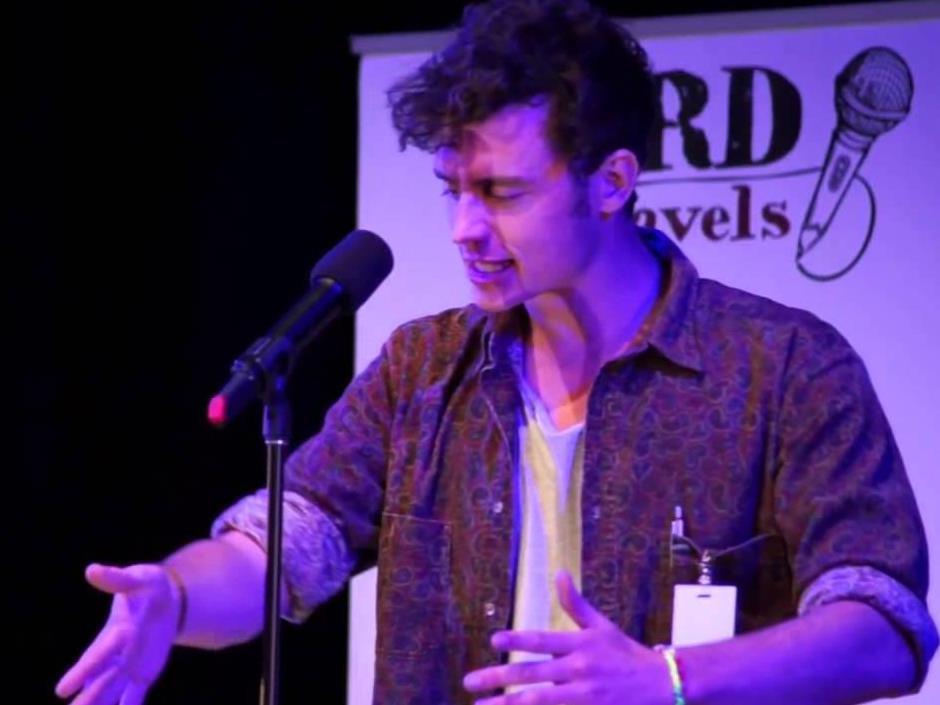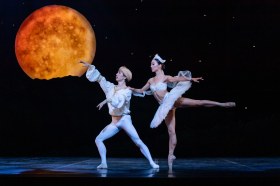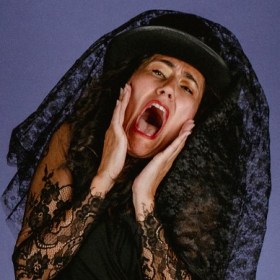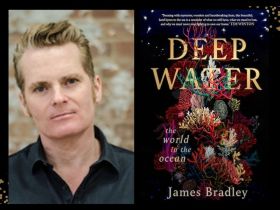Slam poetry champion Philip Wilcox in action. Image via youtube
It is poetry slam season. Last month Philip Wilcox took the mantle from Zohab Khan as the new Australian Poetry Slam Champion at the Sydney Opera House. And later this month Sydney will be holding one of Australia’s largest poetry slam events for the very first time – the 2015 Poetry Olympics.
I have made it a priority not to attend this event. Do not get me wrong, I am avid fan of poetry, including its slam variant. I have attended many slams around Sydney and Brisbane, both as a performer and spectator. But the sad reality is that poetry slams are regressing in this country, and this is unlikely to change unless something is done about it.
Poetry slams have often been heavily criticised in the past for their excessively competitive structure. The contention is that slams corrupt the art form of poetry.
Australian poetry slams, particularly the larger ones, seems to be victims of an even worse plague: a narrowing of what is accepted and appreciated.
Poetry, for a long time, has been safeguarded from mainstream exploitation, unlike other art forms, such as music and visual arts, but this does not seem to be the case anymore.
Sydney is the hub of slam poetry in Australia, its biggest event, the Bankstown Poetry Slam, attracts hundreds of people a month. It provides budding poets with the opportunity to share their thoughts and feelings by expressing themselves in poetic form. However, poetry is and always has been free-flowing and this has provided poets with a freedom to perform any type of poem in any way possible.
One only has to attend some of the larger poetry slams, a handful of times, to figure out that most poets tend to write and perform on a limited number of topics: racism, refugees, feminism and bigotry. You may think this is great, and that these are definitely relevant issues that are at the forefront of Australian and world politics. This is true, and they are also the kind of topics that make up slam poetry the grass-roots movement that it is. But why are more and more slam poets unlikely to venture out of this limited spectrum?
The answer is unfortunately the audience, and the judges (who are randomly picked from the audience). Not only have they set a specific bar for poets in the context of the aforementioned topics, but often they bring their personal views and feelings into judging and finger snapping (the alternative to clapping at poetry slams) as well. In fact, a poet I know was given a low score by one of the judges because his poem seemed to scare her. Apparently that was a sufficient reason to mark him down heavily, despite stage prowess that some others considered exceptional.
Meanwhile, when a poet is not performing well enough, the judges and audience profusely support them, a gesture always promoted by event emcees. This in turn leads to a paradox of sorts. On the one hand you have a poet performing a poem, and if it does not meet the topic criteria, it is not deemed appropriate. On the other hand, if a poet is nervous or afraid, they are cheered on and given a relatively decent score.
The emcees always tell audiences ‘It’s not about the points, it’s about the poetry’ but this cannot be further from the truth. Unfortunately, the current environment has made it all about the points the constraints on accepted topics and tendency to support perceived underdogs pushes poets to perform specifically for the points.
The poetry slam community in Australia has two options if they want to improve on the existing environment. They need to collectively determine whether they want a friendly or a competitive environment. If they wish to opt for the former, which promotes the grass-roots movement that inspired slam poetry itself, then they need to start eliminating the more competitive elements of their slams, and focus more on the freedoms of poetic expression, where poets are celebrated and supported for performing on any topic they wish. Otherwise they should work towards making their slams competitive, and to succeed in doing so they must provide honest judgements and score poets without any form of bias.
Otherwise, poetry is indeed far better, when left on paper. For once it is spoken in such a manner, it will wither away as a whisper almost completely silenced by the sounds of ranting, unwarranted criticism and finger snapping.





